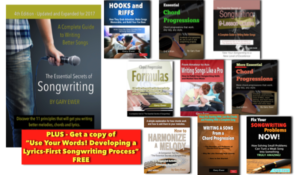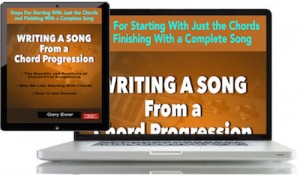Every time you create something, whether writing a song, painting a landscape, or writing a novel, you are pulling two vital aspects of artistic creation together:
- your technical abilities and knowledge, and
- your creative imagination.
In songwriting, we refer to technical abilities by using the word technique, and we summarize the phrase creative imagination by simply referring to one’s musicality or musicianship.
 If you’re looking for one set of eBooks that will cover everything you need to know about writing songs –creating melodies, lyrics, chord progressions, and more — “The Essential Secrets of Songwriting” 10-eBook Deluxe Bundle is what you’re looking for. It always comes with a SPECIAL DEAL.
If you’re looking for one set of eBooks that will cover everything you need to know about writing songs –creating melodies, lyrics, chord progressions, and more — “The Essential Secrets of Songwriting” 10-eBook Deluxe Bundle is what you’re looking for. It always comes with a SPECIAL DEAL.
Musicality is what gets tapped into when you come up with an enticing bit of lyric, a great hook, a well-contoured melody, and so on. Musicality is essential to the final product (a song) because good songs require good ideas to work with.
Technique is what gets tapped into when you assemble bits of songs into something complete. Technique doesn’t work if it’s not partnered strongly with musicianship, though. That partnership might be thought of as artistic vision. Technique is itself enhanced by musicianship.
Musical technique is musical understanding. Where you see technical abilities on display the most is in any musical endeavour that requires lots of writing. Film scoring is a good example. Due to time constraints, a film composer needs to write quickly, knowing that the music needs to be written (and to work) in a short period of time.
The speed with which a film composer writes is more a credit to their technical abilities as a writer than it is acknowledgement of their musical abilities. But what is songwriting technique, and is there anything you can do to improve it?
Technical ability means knowing the nuts and bolts of songwriting. A person with strong technical abilities knows how good music works, and most importantly, what is likely to work even before the writing begins.
That means many things, including:
- Knowing that chorus melodies tend to sit higher than verse melodies in pitch.
- Knowing that verse rhythms are often quicker and shorter than chorus rhythms.
- Knowing that chorus chord progressions are shorter and tonally stronger than verse and bridge chords.
- Knowing that musical energy tends to increase as a song’s section (and the song itself) proceeds.
- Knowing that a musical idea needs to be contrasted and partnered with other ideas in order for a musical work to succeed.
In other words, technical abilities are enhanced by understanding the basic principles of songwriting.
A good metaphor for songwriting technique is to think about a good guitarist. You might hear someone who can play scales so quickly that their fingers are a blur. They may have the ability to play hundreds of chords in innumerable voicings. Their technique may sparkle.
But despite that sparkling technique, their musical ability may be lacking. Perhaps they can’t instinctively tell what kind of playing technique to use for a specific situation. It might be that their sense of rhythm is lacking.
And there just might be something about the way they contribute to a performance that sounds weak. In other words, despite the sparkling technique, the musicality is weak.
This doesn’t at all mean that technique is unimportant. In fact, no good guitarist lacks technical ability. The best guitarists have both musicianship and technique.
As a songwriter, you also need both. Musicianship comes from doing lots of listening and lots of writing. To improve your songwriting technique, you need to:
- Read books from both active songwriters and good teachers that describe songwriting principles.
- Practice your songwriting. For example, choose one aspect of your technique (lyric writing, perhaps), and practice writing pairs of lines that work together to describe an emotion or situation.
- Keep a songwriting journal. Make observations about what you like and don’t like, about what works and what doesn’t work, about the songs you’re hearing.
Technical abilities will take you far in songwriting because it’s technique that helps you craft something that your audience will understand.
Another analogy to help? Technical ability will help an engineer build a bridge that will safely transport all the vehicles it can hold. But artistic vision will tell that engineer what the bridge should look like.
 Written by Gary Ewer. Follow Gary on Twitter
Written by Gary Ewer. Follow Gary on Twitter
 If you like starting songs by working out the chord progression first, you will love “Writing a Song From a Chord Progression.” It’s part of the 10-eBook “Essential Secrets of Songwriting” Bundle.
If you like starting songs by working out the chord progression first, you will love “Writing a Song From a Chord Progression.” It’s part of the 10-eBook “Essential Secrets of Songwriting” Bundle.










